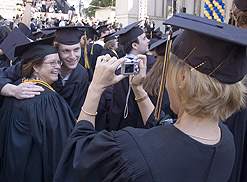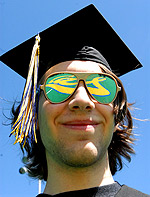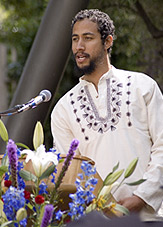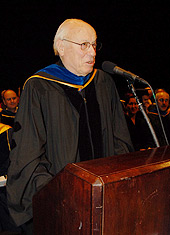Berkeleyan
 |
'The university is a subversive force' (and other wisdom from the podium)
![]()
06 June 2007
Good graduation pictures, in capturing joy and a sense of accomplishment, resemble one another strongly. Good graduation speeches, if carefully written, strike their own singular chords. Here, examples of both, from the Berkeley commencement season just concluded.
Department of Molecular and Cell Biology
Michael Levine, professor of genetics and development, UC Berkeley
First off: Congratulations to the class of 2007, and a warm welcome to the graduates, their parents, grandparents, friends, sibs, and spouses.
A special shout-out to Jack Guan and the other students who took my developmental-biology class, MCB 131. You are now in the top .0001 percent of the worldwide population with respect to your knowledge of how segmentation stripes of gene expression are formed in the early fruitfly embryo. Congratulations.
Graduates: You have received the very best training in cell and molecular biology available anywhere in the world. Well done, and you achieved this at just a fraction of the cost of what the schmucks at Stanford paid for similar, possibly inferior, training.
Legal Studies
Robert Kagan, Heller Professor of Law and professor of political science, UC Berkeley
For the past several years, you have had a special privilege - attending a great public university, one of humankind's most remarkable and admirable creations. Indeed, you have attended the greatest public university in the world. I marvel at this campus every time I walk its pathways - the redwood-lined creeks, the sunlight on the Campanile, the a capella singing groups in Sproul Plaza. It's a park, a peaceful oasis amidst the competition and conflict and suffering of the wider society.
 |
Yet it is not just a park, of course. It's a complicated institution, immensely ambitious in its aspirations, immensely costly to sustain. And most of that cost is borne by our fellow citizens, by the taxes they pay, even though only a talented minority - you Cal students - are able to attend it. Why are the taxpayers and their representatives in Sacramento willing to do that? To pursue an extraordinary ideal - the systematic generation of knowledge, the preservation and enrichment of our culture, the dissemination of knowledge and insight from generation to generation.
Put another way, your society has invested in you, invested in making you into an educated person. They are making a bet - that because of your education, you will end up making our society a better one. To that end, the university has provided a space where you have been able to devote countless hours to your favorite topic - yourself - to your own intellectual and social development, where you have been able to combine study and social interaction with bright young people. What a deal!
Lavender Graduation
Susan Stryker, scholar and filmmaker
There have been big changes over the years in the kinds of social, emotional, and academic support that transgender and other queer students can now get on campus. When I was involved in campus activism here, first as a grad student and later as adjunct faculty, between 1991 and 1994, I participated in a group called the Berkeley Bisexual Lesbian Gay Center. That group created the LGBT Minor Program, worked with the administration to establish the Chancellor's Advisory Committee on LGBT Concerns, and located the start-up money to create the first staff position devoted to queer issues on campus. I can't tell you how gratifying it is to see how the little seeds we planted back then have been nurtured over the intervening decade, and how they've grown - how that first bit of funding has grown into Billy Curtis' position at the Gender Equity Resource Center, and how previously unimaginable things like holding a Lavender Graduation ceremony have now become routine. When I look at this crowd, and reflect on what it has taken to bring us together here today, I find it difficult to feel overly cynical about the future, because our very being here is proof that change for the better is truly possible.
Department of Mathematics
Andrew Fire, professor of pathology and genetics, Stanford; co-winner of the 2006 Nobel Prize in Medicine
Years ago I was standing in the [Berkeley] graduating class, full of goals, energy, unreasonable doubts, and more than a bit of unreasonable self confidence.
Stepping out of my graduation suit, a first, maybe the biggest, lesson was how much there was to learn.
 |
I needed to learn that many people knew more about this than I did, but that this entire wealth of knowledge amounted to just a fraction of what was desired, what was needed, and what was possible. I needed to learn from sage professors in graduate school, from my classmates, from the written literature of scientists long-since retired or died, and from my youngest students.
Only a few of you will choose biological research as a profession; all of you will find ways in which you need to learn. All of you will have peers, senior and junior colleagues, a wealth of literature (including the terrifying Internet and an even more terrifying library) to learn from and filter out gems of critical wisdom. All of you will face the challenge of too much information and the great need to organize, prioritize, and synthesize. I sincerely doubt that any of you will ever give up on learning.
College of Letters and Science language and literature majors
Ronelle Alexander, professor of Slavic languages and literature, UC Berkeley
Although some of your classwork here may have been boring, I'm certain that each of you has at least once gotten turned on by a project you've done or a paper you've written. You got into the topic, and you felt really good about what you managed to produce. And those of you who walked in here carrying a hood over your arm and are going to walk out of here wearing it over your shoulders, as we are wearing them now, you certainly know this. Very soon you are going to hear someone announce that you have voluntarily submitted yourself to a set of traditions, otherwise known as writing a dissertation, and that same person will announce that you have proved yourself worthy to be called a scholar. But by now you already know this. You may need our signatures on a page in order to file the dissertation, but you don't need them to tell you you've accomplished something major. You've learned that yes, scholarship can be tedious, and that it involves endless checking of references and slogging through material that is sometimes really boring. But you have also experienced those moments of pure excitement when you know you have found something new, or have put something together in a totally new way. That discovery was yours alone, the fruit of your own work, and that makes the whole slog worthwhile.
School of Information
Michael Keller, University Librarian, Stanford University
As tyros . . . who have mastered the rudiments of information studies, you now have the responsibilities not just to fledge but to soar, not just to undertake the next step but to carve out a career, to become masters of your profession. However, you enter into an industry or a calling that appears to be one of constant change, where not just the canvas, but also the palate, the brushes, the paint, and the aesthetics of the management and presentation of information are in constant motion. So the challenge of gaining true mastery and constantly gaining it will be with you for your lifetime.
 |
Most of you are receiving master's degrees, signifying a level of expertise and breadth of understanding that each of you would apply in a professional position to the achievement of a goal in presenting, interpreting, extracting, analyzing, interacting with, or affecting policy about information. Demonstrating mastery in one or more of the techniques needed to achieve a mission in the management of information is an early challenge for you. Mastery of a field or aspects of it is essential to success.
Department of Classics and Graduate Group in Ancient History and Mediterranean Archaeology
Erich Gruen, Wood Professor of History and Classics, UC Berkeley
Do the classics have any connection with the major national or international events that haunt us today, that embroil this country with disputes, divisions, and discord? That is a serious question - and a difficult one. I was advised, perhaps wisely, to leave politics and controversial current events out of the speech.. OK, not a word about what troubles our land and our people. No reference to persons, places, or policies in the present day. No, I will speak only of the distant past, of the age of Greece and Rome in which our students have been immersed for some years. Any similarity to contemporary figures or events is purely coincidental..
The study of antiquity has continuing resonance and power. Not because there are direct parallels or one-to-one correspondences: The differences are usually greater than the similarities. And not because there are lessons to be learned, so that we can avoid making the same mistakes that the ancients made. I don't have any such illusions. We will go on making similar blunders and destructive decisions. Rather, we read these classic texts for a depth of insight, a sensitivity to divergent viewpoints, to the ambiguity and complexity of events. We read them on war and empire because they conducted informed debates about legitimacy and consequences. They made plenty of mistakes, and their motives were less than pure. But they engaged in serious scrutiny of policy decisions, they had an acute sense of their own traditions and their reputations, and they possessed a real understanding of how they were perceived by the rest of the world.
School of Public Health
Larry Brilliant, executive director, Google.org
 |
Department of History of Art
Julia Bryan-Wilson, assistant professor, Rhode Island School of Design
It might seem like a struggle at times like this to imagine why the pursuit of art and scholarship matters, but in this era of increasing globalization, images play a more important role than ever. One of the most exciting things about art and visual objects is how they cross national borders and boundaries, becoming a shared language. We can travel through art, not only to other cultures but also to the past. The overwhelming stream of images is only accelerating in the 21st century - we must be able to decode, to interpret, to situate image culture and understand its historical precedents. In these hard times marked by speed and rashness, the manufacture of evidence and the suppression of truth, that kind of attention and slowness, that discipline, that fidelity to facts, to specifics, to details, is a task of great urgency. Some images are hard, painful, things we don't want to see. But there is an ethics, too, in not looking away. It may be that it is the greatest political act today to not shy away, to not be afraid to look closely and ask questions, to be responsible to history, to research, to have doubts, to launch alternative interpretations.
Department of Theater, Dance, and Performance Studies
Carey Perloff, artistic director, American Conservatory Theater
I have learned to love audiences. I never thought I would feel this way. Ever. I still haven't learned to love critics, but there is time left in my career to learn that.
Department of English
Kate Levin, Commisioner, New York City Department of Cultural Affairs
While there are many wonderful advocacy arguments on behalf of public funding for culture, our ability to measure the impact of culture - its "return on investment" - will always be at the heart of any effective rationale.
But unlike policing and paving the streets, the benefits of culture are not so tangible..Because art is, of course, different. At its best, it creates ineffable experiences. It's illogical, it's beautiful, it's transforming. How do you measure imagination? How do you decide how much is enough?...
Increasingly, governments are recognizing that creativity is a real value - a social value, as well as an economic proposition..Investing [in it] at the local level not only makes a city more dynamic and livable for the people already there; it also makes it more attractive to tourists, to businesses, to students, and to artists - a point that was really driven home two years ago in New York City when we brought Christo and Jeanne-Claude's monumental public art project, The Gates, to Central Park..
The very idea of the project generated so much controversy and lively debate that when it actually happened, it felt like the whole world had descended on Central Park to witness it first-hand. And the moment the first gate was unfurled, all the abuse directed at the project and its proponents, and all the anxiety about its purpose, vanished. People were mesmerized, enthralled, puzzled, critical, moved . Everyone, I mean everyone, had an opinion.
In the spirit of government data-gathering, the city undertook an extensive analysis of the event, and concluded that, all told, The Gates attracted 4 million people to Central Park and generated $254 million in economic activity over 16 days, including packed hotels, extra-busy cab drivers, and munificently tipped waitresses.
Certainly quantifying its impact in economic terms - a way that anyone could appreciate - helped show that art has an enormous impact on our lives, regardless of how you feel about the artwork itself.
But appreciation for The Gates moved beyond economic development. No amount of numbers captured what was at once a totally personal and totally collective experience. And no one could put a price tag on the value - post-9/11 - of having New York City in just about every media outlet around the world for something utterly beyond politics, personalities, and even words.
This is, after all, the larger challenge of advocacy - to demonstrate the value of something not everyone may like, or understand, or even encounter. That's my job.
Department of Linguistics
Leanne Hinton, professor of linguistics, UC Berkeley
 |
Department of Philosophy
Winston Chiong, resident physician in internal medicine, Stanford University Medical Center
We now live in a world where ideas are treated as increasingly important, at least instrumentally if not intrinsically. In my own case, I've found that an appreciation for ideas and arguments in themselves, and not solely for the sake of what you can get out of them, winds up being a good guide for what you actually can get out of them. In your undergraduate work here you've probably developed a pretty good sense of how far you really can push a line of argument, and when you should stop before torturing it any further.
As a dramatic example, there are cases when a patient is dying in the ICU, and we can't figure out exactly why - several different organ systems are going down at the same time, and we can't reverse the process until we figure out which organ has suffered the primary insult and which abnormalities are secondary. It's common in these situations for there to be a number of competing hypotheses, and a lot of data of uncertain or equivocal significance. Here it's easy to get wedded to one particular explanation, and to start devising all kinds of convoluted explanations for the data that don't fit. I like to think, however, that if you're comfortable enough with how to run an argument when the only thing that matters is the argument itself, you'll be less likely to get lost when the stakes go up like this.
School of Social Welfare
Ananya Roy, associate professor of city and regional planning, UC Berkeley
At Berkeley, a few years ago, there were protests to express sympathy for the counter-globalization protests that were taking place in Europe. Protesters, mainly Berkeley students, gathered in downtown Berkeley, and as a sign of global solidarity set about to shut down the local McDonald's. This is the rather undistinguished McDonald's at the corner of University and Shattuck. They were not very serious and did not succeed. The next day in my graduate seminar several of my graduate students were elated. They had been part of the protests and said that they had never felt such a rush of energy - it was as if we were part of a peasant insurgency, the revolution. They noticed that I wasn't very convinced. Why not? Did I not deplore the golden arches? Did I not want to see an end to the multinationals of foul food? I wondered why this global solidarity did not give me cause for optimism. Why did I not read this as a sign of hope?
Because when I think about this undistinguished McDonald's at the corner of University and Shattuck, I think of it as one of the only places in downtown Berkeley that is open and inclusive, where for a couple of dollars the city's poor and homeless can get a hot meal, use the restroom, and shelter from the cold fog. Our liberal city is lined with the right places with the right types of global commodity chains: organic food, slow food, farmers markets with blushing heirloom tomatoes and delicate asparagus and robust red onions. But in our attempts to figure out the global politics of food ecologies we have been unable to resolve a simple politics of food: can we all eat?
Department of History
Leon Litwack, Alexander F. and May T. Morrison Professor of American History, UC Berkeley
 |
Throughout history, the fear has persisted that teachers, students, intellectuals, writers, poets, artists, and musicians are more likely than most to disturb the peace, that we are peculiarly susceptible to subversion. We are. Intellectual inquiry is, and always has been, a subversive activity. It has challenged, even overturned formidable systems and brought into question beliefs of long standing - in the sciences and liberal arts, as well as in religion and politics. The university is a subversive force because it asks the most uncomfortable questions, it forces students to reexamine their assumptions and to see and feel the past and present in ways that may be genuinely disturbing. What defines a great university like UC is its receptivity to the new and the untried.
But when that same university becomes an adjunct of the state and accepts lucrative government funding to design a new generation of weapons of mass destruction, it raises serious questions about its mission. When the Defense Department recently announced that the Lawrence Livermore Lab, managed by UC, had been chosen to design the country's first new nuclear warhead since the Cold War, a local newspaper hailed it as a "victory." I would call it less than that: One short step for UC, a giant leap backward for humankind.

